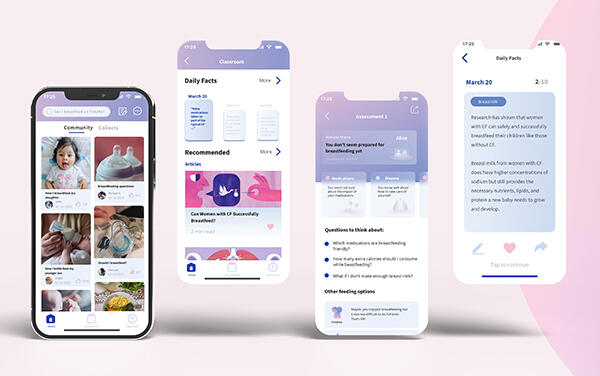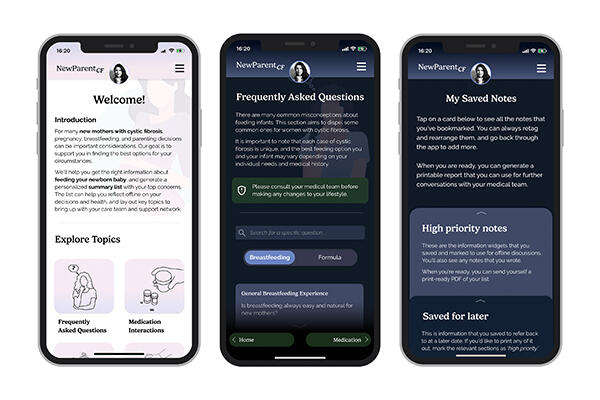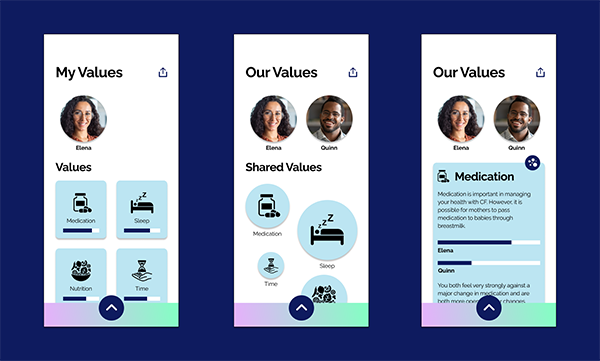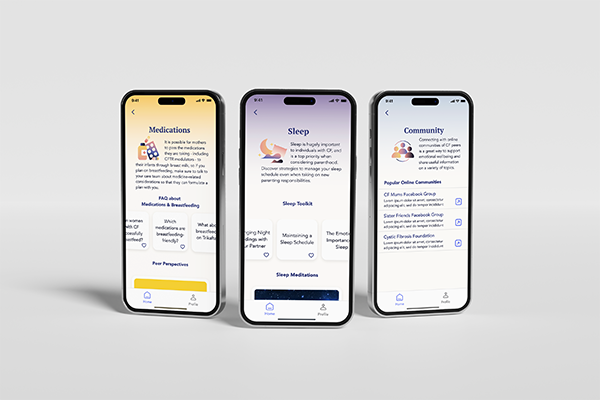MA Cohort Collaborates with CONVERGE to design mobile apps in the FemTech space
This year’s MA Design cohort recently partnered with clinicians at CONVERGE (The Center for Innovative Research on Gender Health Equity at The University of Pittsburgh) to design a breastfeeding decision aid tool for women with cystic fibrosis. The project originated in the cohort’s Intro to Interaction Design Studio course, taught by Raelynn O’Leary and Ashley Deal. The instructors have a strong working partnership with CONVERGE, as they collaborate have collaborated with the Center on various digital tools and are part of their FemTech Collaborative. In 2021, O’Leary and Deal collaborated with CONVERGE on the design and development of MyVoice CF, “a reproductive health tool that provides information related to birth control, pregnancy, and parenting for people with cystic fibrosis.” For the MA cohort’s collaboration with CONVERGE, students were tasked with augmenting MyVoice CF by designing a concept for a “standalone interactive mobile tool that would enable people with cystic fibrosis (CF) to make informed and values-concordant decisions related to breastfeeding.”

The cohort collaborated with clients Dr. Traci Kazmerski and Olivia Stransky to familiarize themselves with the problem space and to understand strategic goals. “As new treatments become available, the quality of life and life expectancy of people with cystic fibrosis (CF) continue to improve. Simultaneously, more people with CF are thinking about if, when, and how to become parents,” Stransky explains. There are a variety of disease-specific challenges that women with CF face in relation to pregnancy and parenting. Some of these include “difficulty maintaining a healthy weight during pregnancy, deciding how to feed a newborn child and how to balance their responsibilities as a parent with their own health needs. CF may also play a factor in deciding whether to breastfeed, as increased caloric burden, quality and quantity of sleep, and medication safety may need to be considered.”

With this context in mind, the cohort designed their initial wireframes and prototypes, using primary and secondary research to shape their initial application concepts. Next, they presented their ideas in a feedback session with the CONVERGE team. They iterated accordingly before holding evaluative user testing with end users—women of reproductive age living with cystic fibrosis—to generate improved solutions. “I really appreciated the chance to interview end-users about our app, as their perspectives helped our solution to be more inclusive,” says Maggie Hung (MA ’23). Hung’s design partner, Annie Heyward (MA ’23), adds “our end user conversations were truly enlightening, as we had never designed in this space before. Their willingness to share their personal experiences with CF was invaluable to us.”

"It was such a pleasure to collaborate with Traci and Olivia on this project," added O'Leary. "They inspired us all with their commitment to better family planning for people with cystic fibrosis! The fact that our students were able to share and evaluate their ideas with research participants from the community that the tool would serve was a great experience for them—and deeply informed the thoughtful and creative solutions they proposed."

The project culminated in a client presentation, during which the cohort’s five proposed solutions were showcased. The CONVERGE team, impressed with the results and outcomes of our MA students, has published the project on their website.
To view the cohort designs, check out CONVERGE’s article.